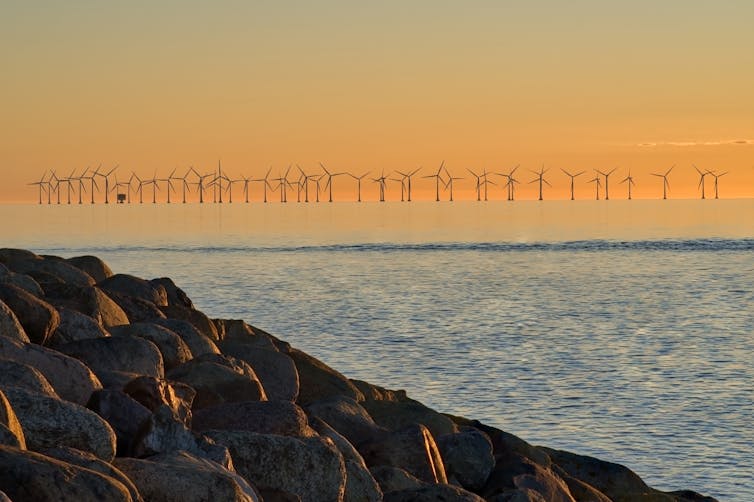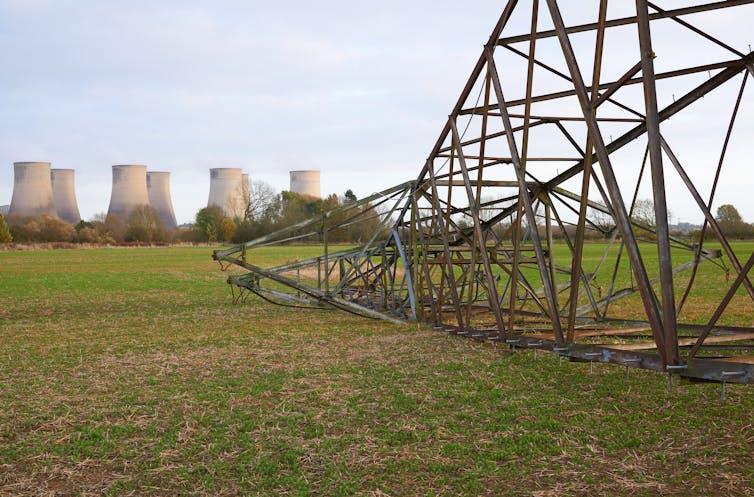Not without a bolder commitment to public ownership.
With Great British Energy, a publicly owned company that would invest in clean power, the UK Labour party pledges to “take back control of our energy”. But will it, as promised, enable Labour to decarbonise electricity by 2030? And how much control would it give the government over the energy system anyway? Enough to lower bills?
The Labour party manifesto claims that GB Energy would receive funding of £8.3 billion over the course of a five-year parliament. With this money, Labour plans to invest in fledgling clean-energy technologies such as floating offshore wind farms or tidal power, in order to make them competitive with more mature technologies like onshore wind.
Labour expects to cut £1,400 from annual household bills by tackling problems that make bills more expensive than they need to be. One is the high price of gas power. Electricity generated by solar and wind is far cheaper, but Labour has not confirmed whether GB Energy will commission private-sector renewable projects through long-term contracts or be a public sector company that will own generators like wind farms.
This is important as the private sector alone will struggle to manage the energy transition.
Energy economist Brett Christophers argues that returns on investment in renewable energy are too low (certainly compared with fossil fuels) to entice private capital to invest in it at the necessary scale.
Research in Europe has shown that state-owned utilities are indeed more likely to invest in renewables than private companies, exemplified by Munich’s municipal utility which should generate enough renewable power to cover the city’s electricity needs by 2025.
There would be downsides to relying on private developers rather than owning a public generator. Private developers will need to be tempted with higher profits to develop solar and wind, making the cost of capital the government must put up expensive. And so the energy itself would be more expensive for consumers than it needs to be, squandering the cost advantage of renewables.
One welcome element of the GB Energy plan is the commitment to use £3.3 billion of the total funding to help local authorities and communities build small-scale renewables, with the revenue used to lower bills.
That same advantage would apply on a national scale if GB Energy owned generators. It is one that has been seized across Europe: in Denmark, over 50% of electricity is supplied by wind and solar due to huge public investment in renewables and the world’s largest offshore wind company, Ørsted, which is majority state-owned.

So, to take back control, GB Energy will need to actually own and run renewable energy generators itself, instead of just providing finance for long-term concessions to private companies which expect high returns for their investment.
The UK still operates the same artificial energy “market” as the EU, which fixes wholesale electricity prices to the most expensive generating sources – typically gas. As such, the price of electricity on the spot market exceeds the average cost of generating it.
Most renewable electricity is traded through bilateral and typically long-term contracts, but the spot market price still influences the prices set in these agreements and so influences the electricity market as a whole.
This artificial market also separates generators from the supply companies which sell power to consumers. That means generators of cheap renewable power cannot pass their savings on to consumers.
Across the EU, energy bills increased by 90% between October 2021 and October 2022. France was able to avoid this and protect customers from the surge in wholesale prices by capping electricity prices to a 4% rise.
France achieved this despite 30 years of energy liberalisation because of state-owned Électricité de France (EDF), which still owns and operates most energy generation and supplies most customers in France, as well as owning the distribution grids via a subsidiary.
Labour will consider measures to “de-link the price of renewables from gas”. This must entail dismantling Britain’s artificial market and following France’s example, with a much stronger degree of public ownership throughout the system.
Power lines, transformers and local networks have failed to weather storms, connect new renewable energy generation and provide a systematic car-charging network.
The UK’s privatised power grid is also a burden on customer bills. More than a quarter of the total cost of maintaining and operating grids, £363 per household in OFGEM’s price cap for July-Sept 2024, will not be used for investment but instead paid as dividends to shareholders, new research suggests.

These dividends are paid out of profit margins which are higher than any other non-banking sector. In 2023, electricity and gas grid monopolies were allowed to extract over £2.8 billion in dividends – about £100 per customer and more than a quarter of the companies’ total revenues. In one year, grid operators have taken out in dividends much of what Labour plans to allocate for community renewables over the next parliament.
Regulation has failed to prevent this happening. Public ownership could eliminate dividend extraction, freeing up money to cut customer bills and invest in renewables.
It would also allow effective planning of decarbonisation. The Conservatives have improbably nationalised part of National Grid to create a public sector agency with overall responsibility for managing the energy system called the future systems operator.
Labour rightly sees this as an opportunity for long-term planning that is very difficult with privatised grids and much easier with those under public ownership. In Europe, this is normal: in the Netherlands, private ownership of grids is actually illegal, and grids are municipally-owned – effective car-charging networks are the result.
So, will GB Energy really make energy bills cheaper and hasten the transition? Not without taking energy back into public ownership. And that means everything: from the grid to the supply companies to the generators of the energy themselves.

Don’t have time to read about climate change as much as you’d like?
Get a weekly roundup in your inbox instead. Every Wednesday, The Conversation’s environment editor writes Imagine, a short email that goes a little deeper into just one climate issue. Join the 30,000+ readers who’ve subscribed so far.
David Hall's research over 30 years has been partly funded by grants from the EU research programme, various foundations including OSF, commissions from government institutions such as the European Commission, social charities such as Oxfam, and international union federations including Public Services International (PSI). He is a board member of We Own It, which campaigns on public services in the UK.
Vera Weghmann works for the Public Services International Research Unit (PSIRU), which receives funding from Public Services International and the European Public Sector Union for commissioned research.